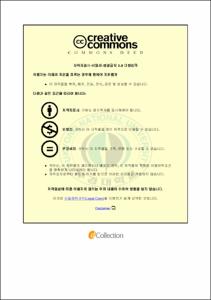상사의 감성리더십이 조직시민행동에 미치는 영향에 관한 연구 - 상사 신뢰의 매개효과(금융업 종사자를 중심으로)
- Alternative Title
- A Study on the Influence of Leader's Emotional Leadership upon OCB - Mediating Effect of Leader Trust (Focusing on Financial Services Professionals)
- Abstract
- A Study on the Influence of Leader's Emotional Leadership upon OCB
- Mediating Effect of Leader Trust (Focusing on Financial Services Professionals)
The financial industry of South Korea came to be faced with new environment internally and externally following the foreign currency crisis. For survival of financial institution, the corporate efficiency and the task result have been emphasized. This brought about many problems. On the back of concentrating on the short-term performance, it led to excessive competition among organizational members and extremely stressed technical capability. Thus, rather than competitive edge in the whole organization, the climate was formed that secures an individual's status and gives priority to the advantage in competition with coworkers. Accordingly, a serious problem happened in the long-term organizational development such as losing mutual cooperation and mutual trust in organization.
To supplement a negative result of this management method, the aim is to suggest paradigm in new leadership through emotional leadership that is noted these days.
Also, as a method for enhancing organizational effectiveness, the aim is to research into the relationship with OCB (organizational citizenship behavior) that may bring about long-term performance in organization and into which prior factors are needed for this, by paying attention to members' extra-role behavior.
This study was carried out in order to examine the mediating effect of trust as for the influence of leader's emotional leadership, which is perceived by financial services professionals, upon organizational members' OCB. It selected the personal emotion awareness and the social relationship management as sub-factors of leader's emotional leadership in financial institution, analyzed the influential relationship with financial services professionals' OCB, namely, altruism, civic virtue, and sportsmanship, and verified mediating effect of leader trust.
Summarizing the results of empirical analysis, they are as follows.
First, out of leader's emotional leadership, the personal emotion awareness was indicated to have positive influence upon leader trust. And even the social relationship management out of emotional leadership was indicated to have positive influence upon leader trust.
Second, the leader trust out of OCB was indicated to have positive influence upon altruism and civic virtue. Also, sportsmanship was analyzed to have positive influence, even if being weaker than two kinds of OCB in the above.
Third, out of leader's emotional leadership, the personal emotion awareness was indicated to have positive influence upon altruism out of OCB. The social relationship management was indicated to have positive influence upon sportsmanship. However, the civic virtue and sportsmanship on personal emotion awareness and the altruism and sportsmanship on social relationship management were all indicated to fail to have positive influence.
Fourth, out of leader's emotional leadership, the personal emotion awareness was indicated to have full mediation effect of leader trust in the relationship with altruism. The social relationship management was indicated to full mediation effect of leader trust in the relationship with sportsmanship. However, the leader trust was indicated to have no mediating effect in the relationship with the remaining sub-factors of the emotional leadership and with the sub-factors of OCB.
Seeing the above results, the conclusion came to be created as saying that a leader's emotional leadership may have positive influence of having leader trust as medium in the relationship with organizational members' OCB.
Accordingly, a leader of financial institution will need to maximize effectiveness of organizational citizenship behavior and establish the strategic standard for human resource management within organization by concentrating a great interest and capability on forming trust available for causing organizational members' OCB while being energic in activity of emotional leadership.
- Issued Date
- 2013
- Awarded Date
- 2013. 2
- Type
- Dissertation
- Publisher
- 부경대학교
- Affiliation
- 부경대학교 경영대학원
- Department
- 경영대학원 경영학과경영학전공
- Advisor
- 류태모
- Table Of Contents
- < 목 차 >
제1장 서론 1
제1절 연구의 배경과 목적 1
제2절 연구방법과 논문의 구성 4
제2장 이론적 배경 6
제1절 감성리더십 6
1. 리더십의 정의 6
2. 감성지능과 선행연구 7
3. 감성리더십의 정의 10
4. 감성리더십의 구성요소 11
제2절 조직시민행동 18
1. 조직시민행동의 정의 18
2. 조직시민행동의 구성요소 21
제3절 신뢰 26
1. 신뢰의 정의 26
2. 상사 신뢰 30
제4절 변수 간 관계에 관한 선행연구 32
1. 리더십과 신뢰의 관계 32
2. 신뢰와 조직시민행동의 관계 34
3. 리더십과 조직시민행동의 관계 36
제3장 연구모형 및 가설 설정 38
제1절 연구모형의 설정 38
제2절 연구가설의 설정 39
1. 감성리더십과 신뢰의 관계 39
2. 신뢰와 조직시민행동의 관계 40
3. 감성리더십과 조직시민행동의 관계 41
4. 감성리더십과 조직시민행동과의 관계에서의 신뢰의 매개효과 42
제3절 변수의 조작적 정의 및 측정 45
1. 감성리더십 45
2. 조직시민행동 46
3. 신뢰 47
제4절 설문조사 및 자료분석 방법 48
1. 설문지의 구성 및 조사방법 48
2. 자료분석 방법 49
제4장 실증분석 및 가설 검증 50
제1절 실증 분석 50
1. 표본의 특성 50
2. 타당성 및 신뢰성 분석 52
3. 변수의 기술통계 및 상관관계 분석 56
제2절 가설 검증 결과 58
1. 감성리더십과 신뢰의 관계 58
2. 신뢰와 조직시민행동의 관계 59
3. 감성리더십과 조직시민행동의 관계 61
4. 감성리더십과 조직시민행동과의 관계에서의 신뢰의 매개효과 64
제5장 결론 69
제1절 연구결과의 요약 69
제2절 연구의 시사점 및 한계점 74
1. 연구의 시사점 74
2. 연구의 한계점 76
참고 문헌 77
설문지 87
Abstract 92
- Degree
- Master
- Appears in Collections:
- 경영대학원 > 경영학과-경영학전공
- Files in This Item:
-
-
Download
 상사의 감성리더십이 조직시민행동에 미치는 영향에 관한 연구 - 상사 신뢰의 매개효과(금융업 종사자를 중심으로).pdf
기타 데이터 / 996.65 kB / Adobe PDF
상사의 감성리더십이 조직시민행동에 미치는 영향에 관한 연구 - 상사 신뢰의 매개효과(금융업 종사자를 중심으로).pdf
기타 데이터 / 996.65 kB / Adobe PDF
-
Items in Repository are protected by copyright, with all rights reserved, unless otherwise indicated.